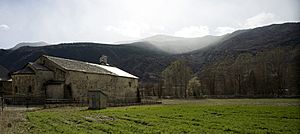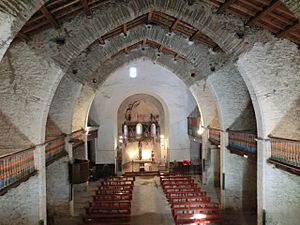Santa Maria, Àneu facts for kids
Santa Maria d'Àneu is an old monastery located in La Guingueta d'Àneu, a town in Catalonia, Spain. A monastery is a place where monks live and work together. This one was first home to Benedictine monks.
The monastery is famous for its beautiful painted apse. An apse is a rounded part of a church, usually at the altar end. The paintings from this apse were moved to the Museu Nacional d'Art de Catalunya, a museum in Barcelona.
Contents
A Look at History: The Monastery's Past
This Romanesque monastery has a very long history. Romanesque means it was built in a style popular in Europe from the 6th to 12th centuries, known for its thick walls and round arches.
The first records of Santa Maria d'Àneu date back to the year 839. At first, it might have been a Visigoth monastery. The Visigoths were an ancient Germanic people. It was dedicated to a saint named St. Deodata.
Changes Over the Centuries
For a long time, until the late 900s, the monastery was dedicated to St. Peter. In the 11th century, it became a Benedictine monastery. Benedictine monks follow the rules of Saint Benedict.
Later, in 1216, the monastery was given to another group of monks called the Augustinians. Over many years, the monastery became less active. By 1723, it had only a few people living there.
A Place for Pilgrims
Despite its decline, Santa Maria d'Àneu remained an important place. People from all over the region would visit it as a pilgrimage center. A pilgrimage is a special journey to a holy place.
Sadly, during the Spanish Civil War in 1936, the monastery was burned. After the war, a new building was made to look just like the old one. Today, the sanctuary is dedicated to the Mare d'Àneu, which means "Mother of Àneu."
Architecture: What the Monastery Looks Like
The main parts of the monastery were built in the early 11th century. It has three long sections called naves. The central nave ends in a main apse, and there are two smaller apses on the sides.
The building also has a small bell tower. This tower has openings for bells, called a belfry. The front of the monastery was completely updated in the 20th century.
Famous Wall Paintings
One of the most special features of Santa Maria d'Àneu was its colorful wall paintings. These murals showed scenes like the Epiphany and the Adoration of the Magi. The Epiphany celebrates the wise men visiting baby Jesus.
These beautiful paintings are thought to be by an artist known as the Master of Pedret. You can now see these important artworks at the Museu Nacional d'Art de Catalunya in Barcelona.
See also
 In Spanish: Monasterio de Santa María de Aneu para niños
In Spanish: Monasterio de Santa María de Aneu para niños
 | Claudette Colvin |
 | Myrlie Evers-Williams |
 | Alberta Odell Jones |



